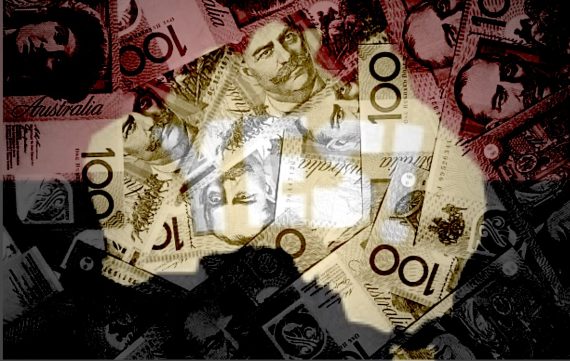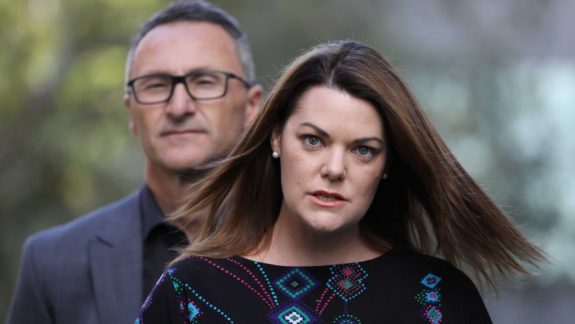Reforming money in politics: crushing Dark Money without eliminating quality independents

One of the most crucial decisions about the shape of our democracy is about to be resolved. The Coalition and the ALP appear to have reached a decision to block any further challenge to their duopoly control. While it is crucial that we introduce strong reforms to stop third parties distorting our elections, we cannot do so in a way that prevents quality independents and minor parties from challenging hidebound incumbents.
The major parties’ falling primary vote has them unnerved and prepared to distort democracy to protect their manifold advantages. We saw over the referendum weekend that the tools of deception, fear and loathing have too much power to sway our elections. Protecting against the big parties’ gambits is crucial to a future where the public has some influence on the shape of the nation.
Alan Kohler has reported on a cynical deal apparently being forged by shadow special minister of state Jane Hume for the Liberals against the so-called teals and Special Minister of State Don Farrell for Labor against Clive Palmer. Their deal will involve “increased transparency, caps on donations and campaign spending, and increased public spending for elections.” These are all measures to be celebrated, unless they work to prevent Australian voters freeing the country from state capture by industry sector.
Ensuring integrity both in donation reform and election spending are critical reforms to ensure transparency in politics; we must have governments that build policy for the common good, not for the donors.
At the same time, it is crucial that we allow scope in our politics for transparent, integrity-run organisations to support quality candidates. Distinguishing this from insidious spending by vested interests and conspiracy cohorts takes fine reasoning and cautious designing of the reforms.
Dark money distorting the Voice debate
The Voice campaign has revealed how much Dark Money is distorting our political debates. Clive Palmer spent over 200 million to distort the 2019 and 2022 federal elections. He claimed to have swung the former to the Coalition with his preferences. Now the coal miner is reportedly spending $2 million on advertising in a last minute bid to swing two crucial states away from supporting the Voice referendum.
The low barriers of the social media era mean that the quantity of money spent cannot be the only metric used to assess disinformation. A Melbourne crypto trader has spent at least $16,000 spreading Voice fearmongering with paid advertising created on a $140 per-month app.
The 7.30 Report last week added to earlier reporting on Dark Money subsidising the Advance group and through it, its subsidiary Fair Australia, which led the No campaign. The ABC’s report focussed attention on Simon Fenwick, also using his Wall St money to fight climate action. Earlier reporting in Crikey listed Advance’s donors including a number of other wealthy Australians.
Mark Kenny described Advance as being founded in the wake of the Marriage Equality plebiscite to mobilise “a hitherto disparate conservative citizenry whose adherents blame “wokeism” for everything from the declining authority of the Christian church to gender fluidity, environmentalism, and the Voice to Parliament.”
We will need to design a strategy that accounts for money in all its forms, including the scope for small social media spending to manipulate democracy.
American strategies in Australia
American Dark Money manipulation is notorious for its longterm vision and its cunning.
Sydney University of Technology lecturer Jeremy Walker has drawn the connections and parallels between Advance and Fair’s No campaign to the insidious American Atlas Network that has worked to dismantle societies for plutocrat gains across the globe. Its ultra-free market machinations have particularly worked to protect fossil fuel interests. As Walker points out, the gas sector in Australia is particularly interested in stopping the union of Indigenous people and climate action.
The connections are rarely straightforward: money and influence have worked in labyrinthine ways over decades to distort the playing field for the interests of the wealthy, in particular for tobacco and fossil fuels.
Over the weekend, investigative reporter Anthony Klan revealed the shadowy status of Advance and its promoters. Precisely in the Atlas model, it has a network of fake “grass roots” seeming bodies – a strategy called astroturfing – that include entities dedicated to attacks on climate action.
One of the great concerns for figures in the fossil fuel sector at this moment when governments have been mainly neutralised is the possibility that court action will become an impediment to projects and profit. Cases brought over combined Indigenous and climate interests have proven themselves to be a merger that the Dark Money does not want to fight.
Jones Day, a law firm at the heart of the insidious “conservative” legal movement in America, with several Australian offices, has focused on the obstacle in the Australian market.
Advance denies connections to Atlas but there is personnel overlap with the Centre for Independent Studies (CIS) which is part of the Atlas Network. Warren Mundine and Jacinta Nampijinpa Price both work with the CIS as well as Advance’s affiliate Fair organisation. Mundine chairs LibertyWorks, the Atlas affiliate with connections to fighting climate action and to promoting Trumpist politics in Australia through the Conservative Political Action Conference (CPAC). Mundine is also chairman of CPAC Australia.
In the USA, parallel spending is also funnelled through Super Political Action Committees (Super PACs). These are independent bodies that have unlimited spending ability to channel donors’ money into advertising campaigns in support of candidates and parties. This frees Dark Money to distort the political information space with minimal constraint. The Australian Coalition already has roughly 86 bodies able to function as a swarm of PACs.
Unless Australian caps on spending are accompanied by careful restraints on how parallel spending is executed, the money that has gone to parties – and much more – will continue to expand on their ability to distort our politics away from the national interest towards vested interests.
Determining good money and bad
It is uncertain how much power the Joint Standing Committee on Electoral Matters (JSCEM) has, or whether it is following instructions from the parties’ strategists.
The challenge stands for the committee to work out how to distinguish between the money that distorts democracy and the money that enhances it. The Coalition and the ALP however have little interest in allowing greater democratic freedom which can disturb their hold on power.
Climate 200, for example, has supported a range of independent campaigns. Once a potential candidate establishes that they have community support in the electorate, and if they share values – a foundational concern for integrity and climate action, as well as supporting women in politics – Climate 200 helps provide the money, largely from 11,000 crowdfunded donors, that will enable the independent candidate to compete with the party politician not meeting their electorate’s concerns.
Climate 200 is unusually transparent about its funding and adamant that it holds no control over the candidates beyond that. Compared to Clive Palmer’s candidates, Climate 200 has backed intelligent, thoughtful people displaying integrity in their goals and responsiveness to their electorates. Most of the candidates elected with a Climate 200 start-up fund have shown themselves to be much more responsive to issues of economic inequity than their major party-affiliated peers.
Up to $3 million was spent on Josh Frydenberg’s federal seat in 2022 and a candidate has almost no chance without seed funding of between $250,000-$500,000 to open an office and hire one or two staff to begin to balance the inherent benefits of belonging to a major party. The Australia Institute estimates that federal politicians receive incumbency benefits approximating almost $3 million from the public purse each electoral cycle.
By enforcing public spending to fund elections across the board, however, the major parties are limiting the ability of the small players and quality independents to challenge the duopoly. Victoria’s state reforms, for example, mean that parties gain a much larger public pay-out from elections once they meet the 4% of primary votes benchmark. Parties can also receive this public funding in advance of a looming election. Independents and minor parties have no way to match that if dramatic caps are also instituted. That money is not taxable for party candidates but is taxable income for independents. All these factors undermine quality independents’ ability to challenge the incumbents.
Candidates representing the major parties also currently enjoy huge uncosted advantage in elections. Brand recognition, habit and national spending campaigns are a boost: if the JSCEM’s proposal to cap spending per seat is instituted, this will be a substantial further advantage for the duopoly.
Victoria’s state transition to public money spending dominating election campaigns has been shaped in such a way as to stop quality independents from being electable.
The interim report of the JSCEM has shown the intention to control money spent on garnering an electoral impact by “associated entities and third parties.” It appears not to have been well designed: Kohler, for example, believes Clive Palmer will still be able to drive “one of his trucks through the loopholes” that the JSCEM reforms will enact. There seems to be no intention to tackle the major parties’ business councils where “memberships” are not treated as donations. The JSCEM needs to do better: this is crucial democracy protection.
We will need an independent committee to assess bodies and individual spending for integrity, transparency, and honesty. Money that tends to be spent on distorting debates ought to be taxed and/or fined. This should cover so-called think-tanks, especially ones allied with international shadowy groups like the Atlas Network. This last category includes the CIS, the Institute of Public Affairs (IPA), and the Australian Taxpayer Association.
The Albanese government has been a disappointment above all in its failure to act on climate beyond mere rhetoric. The new 116 fossil fuel projects listed to commence are a disaster in a moment when every fraction of a temperature rise means more compounding extreme events set to befall us.
Labor, like the 2022 Coalition, must be open to challenge by quality independents and minor parties. Otherwise, the fossil fuel sector is set to maintain its state capture of our governments. Our climate action potential will remain stalled. Parties of government must be forced to respond to community concerns rather than corporate and sector investments. Crushing protest and blocking competition from independents is not how democracy should function.
The referendum showed how vulnerable our electorate is to all the games emerging out of the American Right. It is imperative that we urge the Albanese government to speed up the integrity platform reforms it promised, and to do them with precision. No government lasts indefinitely: Labor needs to protect itself from a post-democratic Right as much as the nation needs them to do it.
If the major parties plan to prevent future challenges to their control of government we need to protest before they embed it in legislation.
This was first published in Peals and Irritations as Dark Money is distorting the Voice debate
Like what we do at The AIMN?
You’ll like it even more knowing that your donation will help us to keep up the good fight.
Chuck in a few bucks and see just how far it goes!
Your contribution to help with the running costs of this site will be gratefully accepted.
You can donate through PayPal or credit card via the button below, or donate via bank transfer: BSB: 062500; A/c no: 10495969










